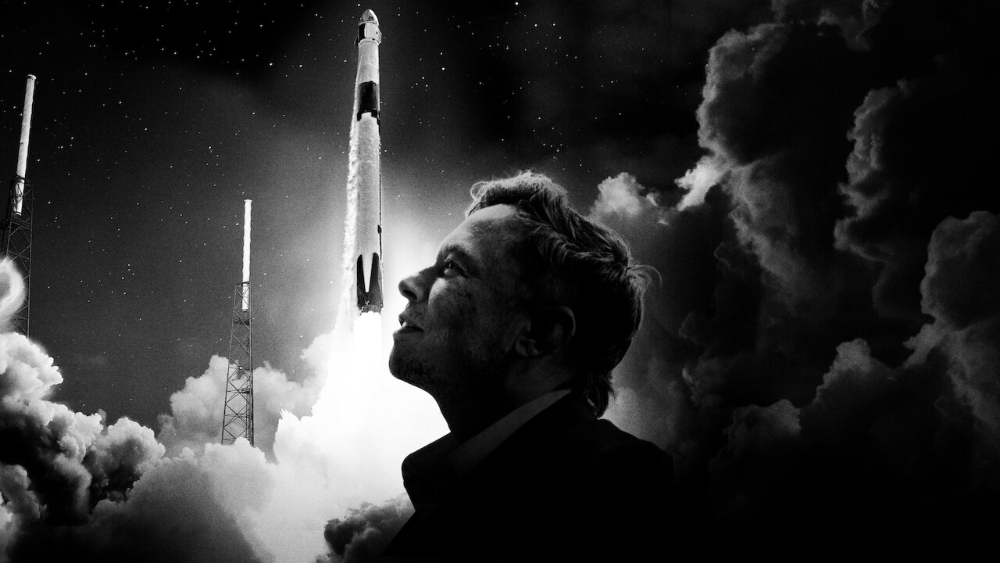
Very few people in the film industry see their careers blessed with longevity, yet composers Mychael Danna and Harry Gregson-Williams have bucked the trend, hanging around Hollywood long enough to each forge formidable filmographies that have brought them numerous awards, including Oscars and Emmys.
Danna, for example, won an Academy Award for the Life of Pi score, though it’s his work on Stillwater that holds a special place in my heart, as do the Narnia movies that Gregson-Williams composed. The latter is also coming off of two Ridley Scott movies — last year’s House of Gucci and The Last Duel.
Now, Danna and Gregson-Williams have joined forces to compose the score for Return to Space, a Netflix documentary that brings you behind the scenes of NASA and SpaceX as they attempt to send astronauts back to space. The film hails from Jimmy Chin and Elizabeth Chai Vassarhelyi, the Oscar-winning duo behind Free Solo, and it finds a fresh way to illuminate the personal challenges that each astronaut must overcome as they prepare to head out on their missions. It’s a unique film that manages to find intimacy in outer space.
The score by Danna and Gregson-Williams is simply astounding. Some tracks feature a sci-fi sound — I personally recommend “Retiring the Shuttle” and “Luck is the Super Power You Want” — while others bring poignancy to the more intimate scenes. Clearly, I’m not the only one who felt this way about the score as the TV Academy nominated it for Outstanding Music Composition for a Documentary Series or Special.
Danna and Gregson-Williams recently spoke to Below the Line about their Emmy nomination, their collaborative process, their use of synthesizers, and Danna’s new film, Where the Crawdads Sing, which is now playing in theaters.
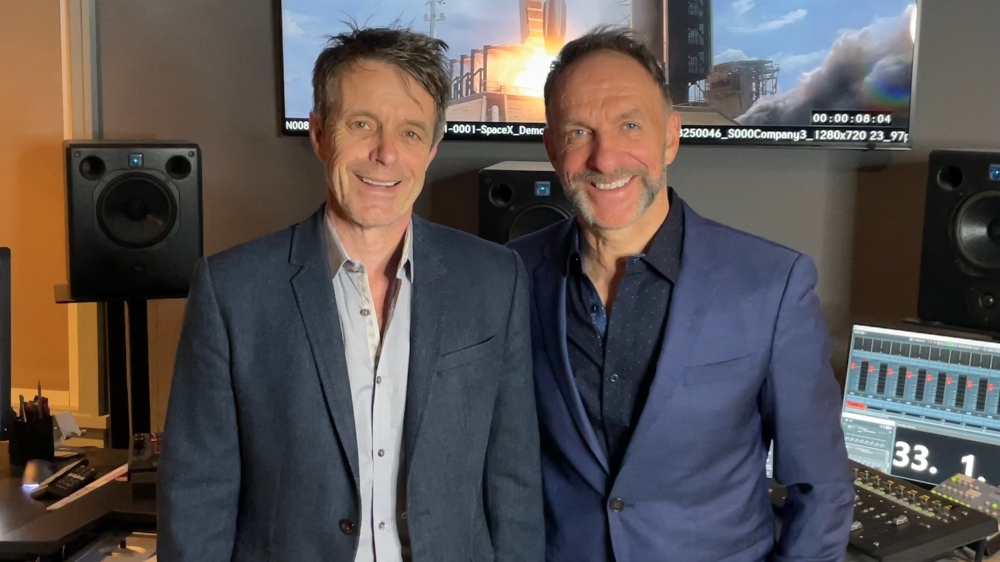
Below the Line: Congratulations to both of you on your Emmy nomination. I know that you guys are both decorated composers, but is there anything about this nomination for Return to Space that was particularly special?
Harry Gregson-Williams: Oh man, it was special for lots of reasons. Mychael, my co-conspirator here, he’s very decorated. I haven’t risen to those heights, but it’s special just because it’s our peers and fellow composers and whatnot voting for this, but it also means something because people must have watched the film, and I felt it got a little bit lost on Netflix. And I’d encourage people to see it because it’s really smart and it’s really informative. But for me, and I think for Mychael, [it was] the opportunity to work with Jimmy [Chin] and [Elizabeth] Chai [Vassarhelyi], having seen Free Solo and The Rescue, [and] we were really thrilled to get this opportunity to work together as well.
Mychael Danna: It started with a conversation about us complaining about our respective brothers, who we often work with together, and kind of jokingly, we said, ‘Oh, we should switch our brothers out for each other,’ and we both were up for this project [Return of Space] and both of us [are] huge fans of Free Solo — a masterpiece — and then we thought, ‘This is it. This is our moment to work together.’ So it was a fantastic experience working with two of the greatest documentary filmmakers of our time, and then, for Harry and I to work together and go into some really fun ground — well, ground meaning space — and yeah, it was a great experience. And then to have it capped off with an award that is judged by our peers, by our friends, our fellow composers who have [trained] ears, it’s something that makes you really feel good about your work when people who know what they’re doing vote for you. So [I] really appreciate it, and we’re up [against] some other great composers, so it’s all good. It’s going to be a fun night.
Gregson-Williams: We don’t have the same agent. I mean, we’re really good friends, we’ve been friends for many years and we talk and we see each other, and I think on one occasion we were together, and maybe Mychael mentioned, [that he was] up for [Return to Space] and I’m like, ‘Well, so am I. Why don’t we try and outmaneuver the opposition and do this together?’ So that’s really how that happened. It was kind of coincidental.
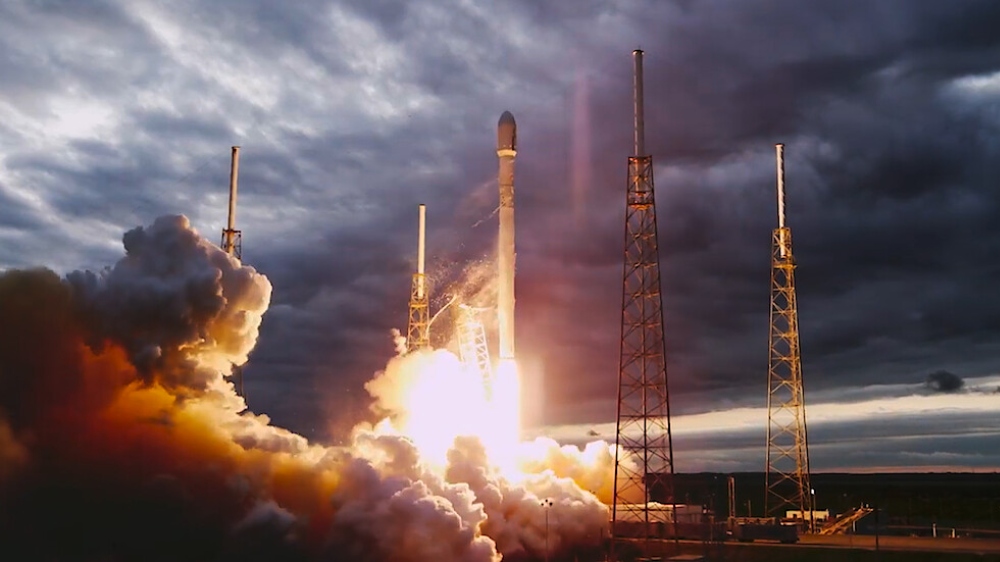
BTL: Before diving into Return to Space, I know you’ve both had long, varied careers, but if each of you had to recommend one of your earlier projects, which one would you pick?
Gregson-Williams: Man on Fire.
Danna: Yeah, we have those long resumes because we’re both really, really old [laughs]. I would say one that I have a film in the theaters right now called Where the Crawdads Sing, and it’s a score I’m really proud of [and] I would point people to a film experience right now. But some of my early films, like The Sweet Hereafter or The Ice Storm, would be another two.
Gregson-Williams: I love that film, The Ice Storm, and I like the score you did. Do you notice one was love and one was like? I’m not sure I got that the right way around [laughs]. That was the first time I really noticed your music and that was before we’d met and when Mychael and I first knew each other, we used to joke about being kind of envious of the sort of projects that [the] other were offered. I really wanted to do a film like The Sweet Hereafter or The Ice Storm, I mean, I really did, and I really wanted Little Miss Sunshine. You know, I was like, ‘Dude, no one wants me to do those movies,’ and I think I was probably doing the seventh Shrek at the time [laughing] and he said, “Well, no one’s asking me to do that.” So yeah, we are happy with our lot and we are particularly happy to get to work together on this thing, Return to Space.
Danna: Yeah, and it’s true admiration for each other before we met. I think [both] Shrek and Narnia are masterpiece scores, and [House of] Gucci was one of my favorite films last year. When we finally did meet in Belgium in a series of bars, I think we went and we did a whole pub crawl and halfway through, Harry got a call from his agent — this was about midnight in Belgium — who said, ‘Oh, you’ve just been hired on a very big film.’ Do you remember what it was, Harry?
Gregson-Williams: No. I have no idea.
Danna: It was an early Marvel movie, Wolverine [note: it was X-Men Origins: Wolverine], and from that point, you were standing [i.e. paying for] drinks for the rest of the night.
Gregson-Williams: That was a high-low for me.
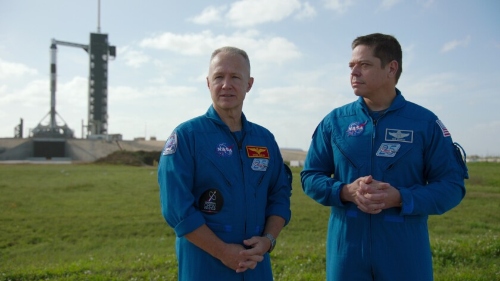
BTL: So that’s how you guys met, but how did you guys end up working together on Return to Space?
Gregson-Williams: Once we got the assignment, the filmmakers at that point hadn’t [finished the film] and this is fairly typical of working on a film. I mean, the film I’m working on now is probably a half-hour longer than it’s really going to be. You know, it’s a collaborative process, [but] it’s a process. So oftentimes people — who maybe don’t know the business — will say to me ‘Did they give you the finished film?’ And that’s kind of naïve. The answer is no, never. We are part of the filmmaking process and very much so in Return to Space.
There was talk of it being one episode, [there was] talk of it being two, two-hour episodes. There was talk of it being a very, very long film. And then eventually, they condensed it into what you see, which is one film. And Mychael will tell you himself, but he had a particular interest in space. I’ve had a particular interest in synthesizers since I bumped into the little-known German composer Hans Zimmer [laughs]. I’ve had a fascination with them since and we’ll use them at any opportunity. Mychael, over to you.
Danna: Well, I think I’m a little older than Harry, but I was 10 when the first moon landing happened in 1969, and for a 10-year-boy, that’s about the biggest thing you could possibly do. And right at the same time, Moog synthesizers were coming in. So my two favorite things were space and synthesizers. I ended up being Composer-in-Residence at the McLaughlin Planetarium in Toronto for about five years in the kind of early 1990s, so it’s a love of mine that kind of goes way back, writing space music and so on.
So this was a project that both Harry and I had a real affinity [for] and we knew [that] given the subject matter, it demands a few things, and Harry can talk about part of it. But I would say one thing that was important to us was the boldness of an explorer like Elon Musk continuing this line of American space travel [on the] cutting, bleeding edge of human exploration that started in the 1960s and then got cut off in 2011 when the program was shut down.
And that’s when he stepped up and said, ‘I will continue it on in a private, enterprise way,’ so this is a character who [has] a once-in-a-generation kind of influence and importance and a man who’s bold and adventurous, so we wanted to have a sense of that in some of the synthesizer choices. We use a lot of old analog since that would’ve been contemporary with the early 1960s American space program, so it seemed to fit like a glove in that way.
Gregson-Williams: Absolutely. And once we started to dig in, the way we worked is [that] we’d swap files. We were in the same room — often enough around a piano — but scoring a film [and] collaborating, one of the fun things about collaborating is that one has to take a leap of faith and trust your partner enough to be able to take criticism or to be able to understand constructive criticism.
For instance, once we’d worked out the sonic landscape of what we were going to be doing, which as Mychael said, was kind of parallel to the space program, NASA’s space program, not so much [Elon] Musk’s, because he started much more recently. But with the advent of analog synths and all that, we thought we’d used that and we’d certainly thrown in an orchestra if we needed one, which we did.
Once we had that, the sort of sonic landscape, we had a couple of themes knocking about, we went to our perspective studios and we would share files. Mychael would send something to me and I’d immediately latch onto a certain crazy sound he’d made on goodness knows what [and I’d say], ‘You’ve got to send me that file. Just that audio file. I’ve got a thought of where I want to use it in a cue that I’m thinking of.’ So we would do that and the joy of collaborating is being open with each other and not only with each other but then with the filmmakers. You, as a composer, have got to be able to take criticism and take it positively and constructively [to] be able to move to the next place. But with music, and it’s interesting because we’ve got our own tastes and we know each other’s strengths as well, and so we leaned into those quite a bit.
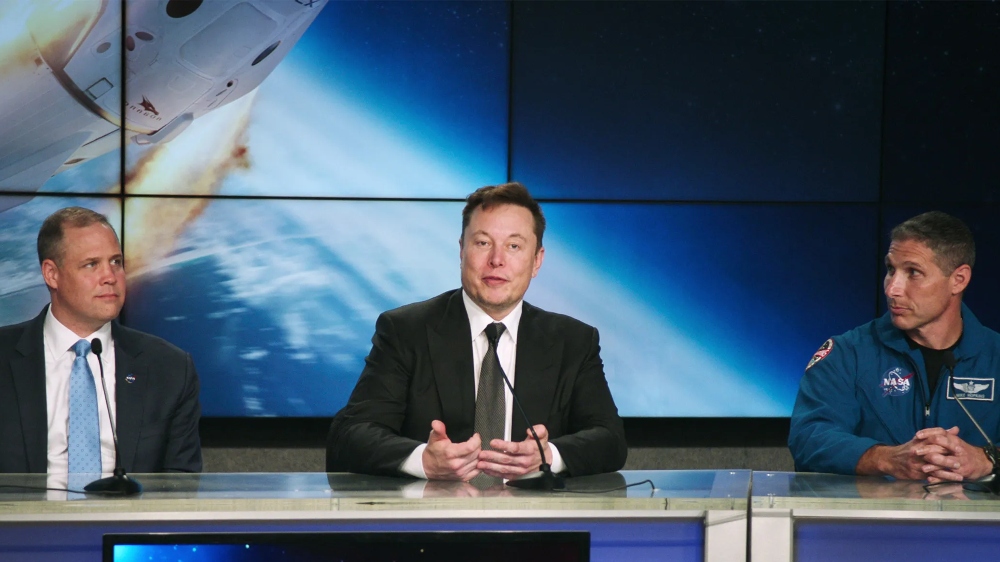
BTL: Harry, you mentioned Hans Zimmer and I have to ask, were there any inspirations that you guys had in mind coming into this film? One track in particular, “Luck Is the Super Power You Want,” felt reminiscent of Zimmer’s Interstellar score to me.
Gregson-Williams: No, not really. We weren’t given hard guidelines, either. The core of this thing is a story set on Earth; a story of the two astronauts who [piloted] the first manned spaceship to go, you know, craft a rocket to leave Earth’s orbit, which was funded privately, so it wasn’t NASA. I think it was called Falcon, wasn’t it? And he and Musk got all this money together and I think [they had] two or three chances to send a rocket up. They were unmanned, and I think on the third attempt, it was successful.
So after that, they were going to put these guys, Doug and Bob [laughs] — Doug and Bob, that sounds like an HBO animation — [and] we followed their story. It’s a family story. I know we could relate to it. Maybe Elon Musk and his space program are not very relatable to us ordinary mortals, but these two [guys are] not ordinary guys. They’re obviously really smart and highly trained, but they’re guys with families they’re going to leave behind. They have no idea whether they’re coming back. I thought there were really some very poignant moments in there, so we leaned into that and we called it a family theme because it was the astronauts and their families and the emotional journey that they had to make.
BTL: I know you guys touched on what the collaborative process looked like with you guys sharing files back and forth, but can you take me a little deeper into that? Were you each scoring- to-scene separately? Or just writing music on your own and comparing?
Danna: Yeah, we did score-to-scenes because even though the picture was certainly evolving as we went, we were — as Harry beautifully put it — part of the filmmaking team. When we came on, it was four hours [long] and it got shorter and shorter and more focused, so we had to kind of find our themes. We found them early but we had to obviously sculpt it a fair bit as the show developed. But we certainly were writing things in when sending files back and forth as Harry explained. One of us would say, ‘Oh, that part you wrote right there, that is perfect for this space; the kind of jeopardy, the tension, and space — that sound there is really great. Can you shoot it over to me?’ or ‘This theme here, this really feels warm and comfortable like [it] really builds the family connection. I want to use it in a scene I’m doing so can you shoot over the music?’ So things like that and a lot of back and forth.
As Harry said, as film composers, you [need] not just thick skin, but you just left your ego at the door. You get notes all day, every day from directors or music editors and there’s no ego involved in either of us anymore; it’s long been burned away and so we have no problem of Harry saying to me, ‘Look, I think you got off on the wrong foot in this cue; this is really a family moment, [you’re] not really addressing [that], this needs to be warmer,’ or whatever.
So we gave each other notes early on, and then once we show it to the directors, Jimmy and Chai, they would then give us their notes and we’d further sculpt it. But that’s how the process went over the several months that we were on this.

BTL: And you guys mentioned synthesizers, could you talk a little bit more about using them during this scoring process?
Gregson-Williams: I think as Mychael eluded to, he’s been fascinated [with synthesizers] for a long time, and he owns some pretty cool analog synthesizers. You probably [can] see in the background here, replicas of those, or this Arturia here does a fantastic job — it’s called a Polybrute — of feeling like it was invented in 1970. Well, it wasn’t; it was invented probably two years ago. I do actually have a proper Moog over there [points behind him], but Mychael actually has some actual synths from the time.
Now, there are no prizes for authenticity, necessarily. However, it was really nice to have Mychael. I would send music over to Mychael and he would layer over some of his synths and this is how we collaborated really.
BTL: Before I let you guys go, can I ask what’s coming up for you guys? I know Mychael, you mentioned Where the Crawdads Sing, which I haven’t seen yet.
Gregson-Williams: I walked out after 50 minutes [laughs]. No, no, no, no, jokes aside, I actually liked it and I loved his score. Did you notice I liked the film and I loved his score? I thought the score was lovely [and] the score elevated that movie quite a lot.
Actually, Mychael, I saw your little thing on Instagram with some guy playing a conch, glad you bracket those things, mate. When I did The Meg, four or five years ago, I had a sample session with some dude who showed up with like hundreds of conches — I was so excited — and by the end of the day, I had such a headache and I had nothing that I could use. Yours sounded so sweet. It sounded like a Soprano saxophone or something, like some really rancid Ford car horn.
Danna: This guy [Don Chilton] is a horn player; he played it [the conch] like a horn.
BTL: And what about for you, Harry? What have you got coming up?
Gregson-Williams: I’ll be doing the second season of The Gilded Age shortly, and I’m excited about that. And then Chicken Run: Dawn of the Nugget 20-something years after we did Chicken Run, so that’s coming down the pike. Actually, speaking of The Meg, I think The Meg 2 is going to be a really, really fun movie. I’m working on that now with a cool English director named Ben Wheatley, and I’m very excited about that.
BTL: OK, before we wrap up, whenever I interview multiple people who have worked together, I like to make them complement each other. So could you two name one thing that the other brought to the table while making Return to Space?
Danna: Harry has a beautiful, melodic sense, just really moving melodies and you can hear it in all his films.
Gregson-Williams: It’s no secret [that] Mychael has some sort of a quirk within his soul, and when I say quirk, it’s sort of a kink [laughs], it is. It’s fascinating to me because I don’t think of these things. There’s a prime example in the score, [there’s] a cue that Mychael started and I maybe crossed the t’s and dotted the i’s on, but it’s a little piano melody — it might be called “Training” — and when he first played it, I was like, ‘Damn, man, I don’t even know what meter this is in.’ There’s always a bit of a wink going on in his music, and I’ve always appreciated that.
Return to Space is now streaming on Netflix.





